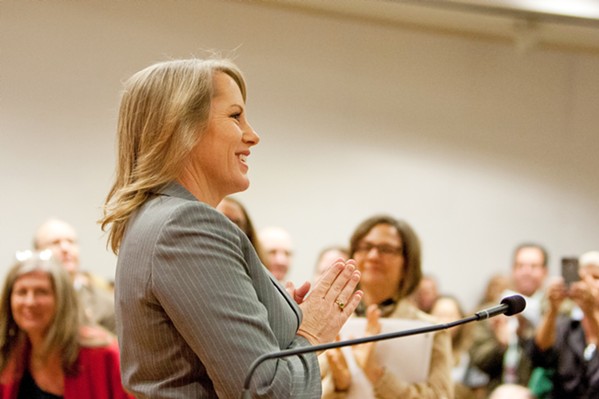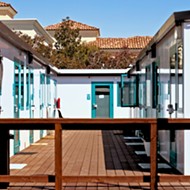[{
"name": "Newsletter Promo",
"id": "NewsletterPromo",
"class": "inlineCenter",
"insertPoint": "4",
"component": "15264767",
"requiredCountToDisplay": "0"
},{
"name": "Ad - Medium Rectangle CC01 - 300x250",
"id": "AdMediumRectangleCC01300x250",
"class": "inlineCenter",
"insertPoint": "8",
"component": "2963441",
"requiredCountToDisplay": "12"
},{
"name": "Ad - Medium Rectangle LC01 - 300x250",
"id": "AdMediumRectangleCC01300x250",
"class": "inlineCenter",
"insertPoint": "18",
"component": "2963441",
"requiredCountToDisplay": "22"
},{
"name": "Ad - Medium Rectangle LC09 - 300x250",
"id": "AdMediumRectangleLC09300x250",
"class": "inlineCenter",
"insertPoint": "28",
"component": "3252660",
"requiredCountToDisplay": "32"
}]
The Arroyo Grande City Council tabled an ordinance on Feb. 8 that would have amended accessory dwelling unit (ADU) regulations and established guidelines for tiny homes on wheels.
But the long meeting had an unusual beginning. Four of the five City Council members, including Mayor Caren Ray Russom, recused themselves for having conflicts of interest related to ADUs.
"We sought advice from the Fair Political Practices Commission [FPPC] regarding whether the mayor who owns a secondary dwelling unit and Councilmembers [Lan] George and [Keith] Storton who are constructing ADUs, and Councilmember [Kristen] Barneich will be paid $1,500 for designing Councilmember George's ADUs, could take part in considering the new ADU ordinance," City Attorney Timothy Carmel said at the meeting.
Jimmy Paulding was the only council member left, until an FPPC-advised random selection allowed George and Storton to rejoin deliberations to maintain the necessary three-party quorum. Russom and Barneich exited the Zoom meeting and returned after a decision was made.
The three-member City Council didn't support the ADU regulations update presented at the meeting. City staff included provisions for tiny homes on wheels in the proposed ordinance updating ADU regulations but City Council members felt it was inappropriate.
Community Development Director Brian Pedrotti told New Times that the council wanted to split tiny homes on wheels from ADUs in city rules. City staff plans to bring separate revised ordinances to the council later in the year.
"Tiny homes on wheels have become a trend across the country for affordability. Obviously, they're more mobile. In the rural areas, they're potentially a good option for farmworker housing because of the movement of workers throughout the county. I know that there has been some uses for them up in areas where there have been wildfires. The biggest option for the city of AG would just be another potential housing option," Pedrotti said.
One of the reasons that gave council members pause when it came to tiny homes on wheels was that the DMV requires them to be licensed and registered, so they don't fall under the California Building Code.
Randy Russom—Mayor Russom's husband—expressed his concerns with the homes as a member of the public during the meeting. Randy called the tiny homes on wheels project an "ill-conceived approach ... to subvert the building code."
"What we're talking about here is essentially an RV. It is not regulated by the state Department of Housing and Community Development [HCD] but is regulated by the DMV, and meets the standards the DMV provided and not those by the California Building Code. So you're effectively putting an RV and making that available for people to put on their side yards and backyards, and sell or rent at market rate the same way you would have to for a normal state-built ADU. That's what's going to dominate the market and we're gonna have RVs and not compatible ADUs," he said.
Randy added that unlike typical ADUs, tiny homes on wheels don't have safety regulations like fire protection and building separation rules "built into them."
"The city [is] abdicating their responsibility to provide appropriate affordable housing if that is what their values are instead of moving it on to opportunities for homeowners to make profit by putting RVs on their property at the expense of adjacent landowners' property values," Randy said.
The proposed ADU regulations update was supposed to bring the city into compliance with state legislation. Pedrotti said that city staff would allow ADUs in the current planning process to move forward.
"The impact to city residents with ADUs is that our ordinance isn't as clear as the requirements in state law. So there might be a bit of confusion about what is required for ADUs based on our existing municipal code," Pedrotti said. "Probably the great impact would be the tiny homes on wheels. We don't allow them currently in the city. That delay would delay the ability of residents to have that as another affordable housing option." Δ
Latest in News
Comments (3)
Showing 1-3 of 3
Readers also liked…
-

Coast Unified teachers upset over new position's salary and qualifications
Oct 20, 2022 -

SLO police identify alleged driver who hit and killed couple
Dec 22, 2022 -

When the levee breaks: Oceano residents, county officials walk a tightrope of regulations to manage Arroyo Grande Creek, which some say led to the levee's failure in January
May 18, 2023








